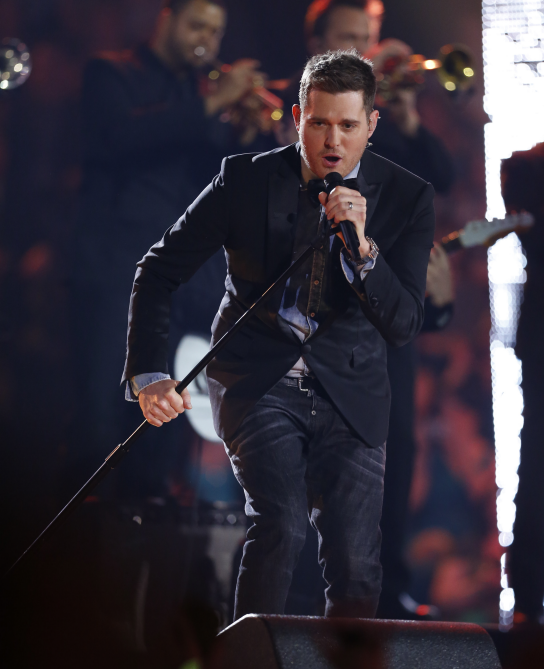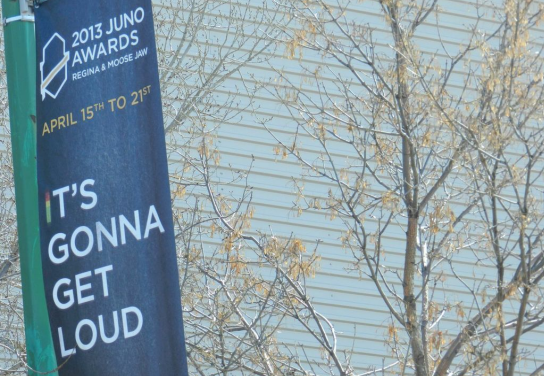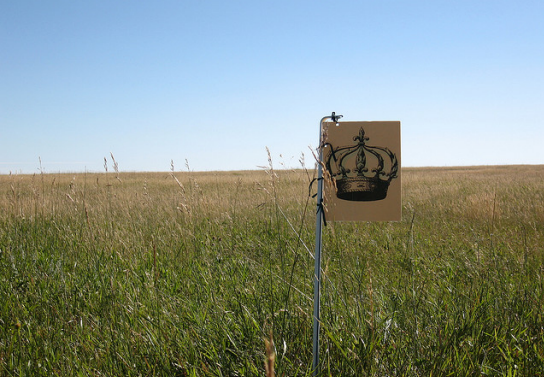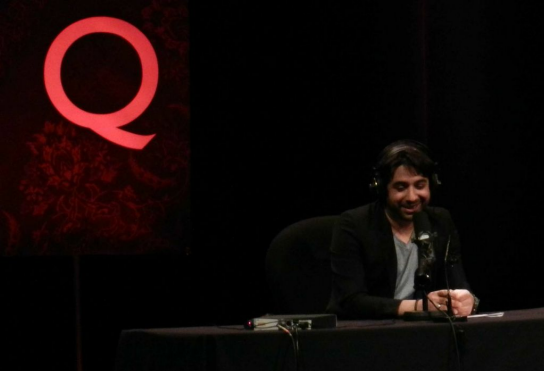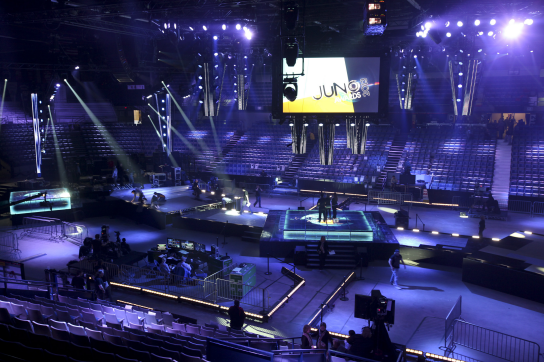By Dessa Bayrock (The Cascade) – Email
Print Edition: May 8, 2013
My Juno journey started in March on a whim.
Curiosity drove me over to the Juno Awards website to take a gander at the list of nominees. It was a pretty solid list; Canada is practically bursting at the seams with musical talent. And then I found myself looking at the press page.
“Click here to apply for a press pass!” it said.
So I did.
And then they called my bluff by actually giving me a pass.
“Touché, Junos,” I said, as I spent my entire (if meagre) vacation fund on a plane ticket and hotel room. I couldn’t exactly say no, could I? That would be rude.
This is how my jam-packed and five-day Juno journey began.
“I’ve never been to Regina, but how bad could it be?” I reassured myself, before I took a look at the below-zero temperature expectations for the week.
So what are these Juno Awards, anyway?
For starters, it needs to be clarified that the often all-capped “JUNO” doesn’t actually stand for anything. The awards are named after Pierre Juneau, who was the first president of the Canadian Radio-television and Telecommunications Commission (more fondly known as the CRTC, the star of many lower-level MACS courses). He was also the president of the CBC at one point. Basically, this fellow is the king of Canadian media. He was a driving force behind stuff like Can-Con, making sure a certain amount of Canadian music makes it onto the radio and a certain amount of Canadian shows make it onto networks.
A variety of groups have organized the Junos over time. The shindig got started in 1970, when the magazine RPM turned their annual list of best-selling Canadian albums into a full-blown awards show. It was renamed the Junos in 1971, and a panel joined the process to decide awards unrelated to how well the artists or albums sold.
Day one: planes, clouds and meeting Regina
The day began at 4:30 a.m. when I left the house to catch my flight to Regina. After heading to two wrong gates and attempting to get on the incorrect plane, I finally began the journey to Edmonton, and from there catch the connector to Regina.
As the plane left Edmonton on the final leg of the journey, the clouds beneath us looked like someone had ripped apart giant sofa cushions, leaving cotton stuffing everywhere.
I was disappointed to see a generous amount of snow on the ground when we finally descended through the cloud layer, but not really surprised.
Roads and rivers stretched out like the lines of an Etch-A-Sketch in every direction. I was concerned at the lack of buildings.
“But where’s Regina?” I felt like begging the person next to me. “I don’t see any city!”
I expected something more akin to Vancouver than Chilliwack, but Regina is definitely on the small side of city size. That being said, it’s packed to the gills with Juno mania. Signage is posted on almost every surface – banners strung up in the airport, posters and leaflets gathering in corners like fallen leaves. My own frantic search to find last minute accommodations informed me that nearly every hotel, motel and hostel is booked up full until the following Wednesday.
I’ve never been to Saskatchewan before, but there’s a first time for everything. My initial impressions? Very flat. Very cloudy. The people seem nice.
Day one: So I’m in Regina. Now what?
I arrived too late to pick up my press badge, but I managed to snag one of the last tickets to the nearly-sold-out taping of Jian Ghomeshi’s Q at the Conexus Arts Centre.
Jian Ghomeshi—aside from being wickedly handsome and wildly charismatic—is a Canadian ‘90s pop darling. He was a member of the satirical and sometimes a cappella band Moxy Früvous, probably best known for their song “King of Spain,” and these days he is the host of CBC Radio’s Q, a show focused around long-form interviews of artists, filmmakers, musicians and politicians.
He ran through the plan for the evening as though we were all sitting at his kitchen table and had just arrived for a night of board games.
The show would start recording at 7:06 p.m. and run as though it were playing live for two hours. It wouldn’t be edited after we finished (so whatever happened, happened), and would play the day after in Q’s regular time slot on CBC Radio.
“I’m going to say, ‘Happy Friday,’” Ghomeshi warned, half-jokingly. “Now don’t you get confused by that! Any questions?”
The audience members looked around at each other, waiting for someone to ask a question. There were no questions.
“Go Riders!” one guy finally yelled.
“‘Go Riders!’ is not a question, sir, but thank you for representing Regina,” Ghomeshi replied.
With that, we were off. The musical introduction built up into the familiar tones of Q and Ghomeshi dropped into his most seductive baritone voice.
“Well, hi there. Happy Friday – and happy Friday from the Conexus Arts Centre in Regina, Saskatchewan!”
In a nod to the Juno Awards, Ghomeshi interviewed Dragonette, Bahamas, k. d. lang, Tom Cochrane and Corb Lund. How’s that for a Canadian music mouthful?
After two hours of solid interviewing, broken up by musical performances, Ghomeshi wound the show down by thanking all the guests and the crew that mans Q behind the scenes.
But even when the show was finished recording, he wasn’t quite done with us. It was time for a question period.
An audience member asked Ghomeshi if he was jealous of Michael Bublé, the host of the televised Juno Awards Gala. Ghomeshi, on the other hand, was stuck with the duty of MCing the untelevised awards.
“He’s the Marcia to my Jan Brady … except I’m a brown Jan Brady,” Ghomeshi said. “Because he gets everything.”
Near the end of the two-hour live show, a woman made her way up to the very edge of the stage and stood there, with her arms outstretched to Jian.
“Oh,” he said, as though it was perfectly natural, and knelt to give her a hug.
As a producer escorted her away from the stage, Jian turned back to the audience.
“That’s the spirit of Saskatchewan, right there,” he said, grinning.
Day two: The loneliness kicks in
Friday marked my first full day in Regina, and I started getting a little bit restless and a little bit lonely.
The worst of it came with my foray into JUNOfest – a presentation of over 100 different bands spread out between a dozen venues over the course of two nights. I picked a show at The Lazy Owl, the student pub at the University of Regina, which starred Indigo Joseph (a local prairie band), Hannah Georgas (a BC-native) and Yukon Blonde (a BC band whose rock and fashion sense summed up the best parts of the ‘90s).
There is probably no better place to feel lonely than a noisy and bustling bar.
I sat at a two-person table in the upper portion of the bar, nursing a beer and steeling myself to try and talk to someone.
Then it happened; I saw a girl heading my way. She was smiling.
This is it! I thought. I’m going to make a friend!
“Are you using this chair?” she said.
I watched as she hauled it over to another table, my spirits falling.
This is possibly the loneliest I’ve ever been, I speculated desolately.
Then the bartender put a giant garbage can where the other chair used to be.
Oh, no, I thought. Now that my date is literally garbage, I suppose this is the loneliest I’ve ever been.
It was a good thing the bands were so spectacular. Music and alcohol are pretty awesome that way; the beer kicked in and I shook myself out of the funk, and that was the end of my lonely saga. The days were too jam-packed after that to get too introspective.
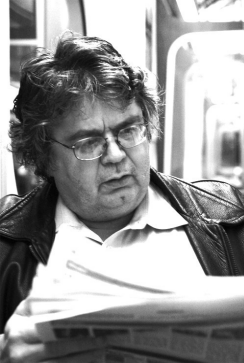 Day three: The untelevised awards
Day three: The untelevised awards
Apparently, there are two nights of awards – an untelevised half, during which the majority of awards are given away, and the better-known televised half, starring performances from all the big names.
The lesser-loved and rarely-spoken-of untelevised awards, hosted by Jian Ghomeshi, saw a whopping 35 out of 44 awards given away.
Larry Leblanc, a prominent Canadian music journalist who was honoured with the Walt Grealis Special Achievement Award at last night’s ceremonies, spoke out against how the Junos have evolved towards the televised/untelevised dichotomy.
“Do we really need to see Billy Talent one more time?” he said, speaking to a room full of media after receiving his trophy.
The Junos started evolving into stark contrast of the two events with CTV’s involvement, Leblanc said, which has pushed many awards to the edges to make room for the bigger and more popular acts, like Marianas Trench and Carly Rae Jepsen.
“The Junos does not represent CTV. It does not represent rock music,” Leblanc said. “When was the last time a classical artist played at the Junos?”
At least a couple of the big awards were given away during the first gala – for instance, Carly Rae Jepsen received Pop Album of the Year, and Adam Cohen accepted Artist of the Year on behalf of his father Leonard Cohen.
And there were some wonderful moments witnessed only by those gathered in the auditorium, and missed by the rest of Canada.
Take, for instance, Pugs and Crows’ acceptance speech of Instrumental Album of the Year – during which the five-person band joined their voices together for an a capella ditty.
“It’s the last 30 seconds of the last song on the album,” the band said afterwards, “but I guess nobody caught that, so we weren’t disqualified.”
One of the most touching moments of the evening was when David Gold’s mother accepted a Juno for Metal/Hard Music Album of the Year on his behalf. The Woods of Ypres member passed away suddenly last Christmas.
“David always said, ‘Love the living,’” Esther Gold said, holding the trophy. “So do that – do that for David. Love the living.”
She asked the audience to “throw the horns” to honour his memory, a hand gesture meant to resemble devil horns popular in metal culture. The auditorium solemnly did so, repeating David’s name three times.
This first awards gala was a celebration of Canadian culture in so many ways – which makes it that much sadder that so few Canadians get to enjoy it, let alone know that it happens at all.
Day four: The climax of the televised gala
I don’t think Regina was built to hold such a sheer crush of people.
About halfway through the show, we were informed that just under 8000 tickets were sold to the televised Juno gala – the largest event that has ever been held in Regina’s Brandt Centre.
Trying to get into the building was like being in a Discovery Channel documentary on migration patterns. Women teetered by in bright satin and stilettos like exotic birds, showing an insane amount of skin for the below-zero temperatures. Tuxedos, suits and cashmere scarves crowded together in the cold, inching closer to the doors step by step.
To be frank, having a media pass to the Junos is not a glamorous experience. We were seated in a designated area, where we had WiFi, power outlets and a live stream of what was happening on stage but no access to the arena itself. Tables upon tables of media representatives from across the country sat quietly together, cordoned off in their own little worlds of work and individual deadlines.
There was a hot, almost cauterizing smell to the room, and it eventually dawned on me that it was the rows and rows of television lights, waiting patiently to illuminate celebrity faces as they were led back to speak to the press.
Winners and performers were kindly herded our way for a Q&A press conference after finishing their duties onstage. Anyone could ask a question.
We knew in advance who to expect; PR personnel handed out lists of who would win what before the show even started. It’s amazing what information people will give you in exchange for a promise not to tweet about it.
So we knew Carly Rae would score a Juno hat trick, and we knew that Adam Cohen would accept Songwriter of the Year on behalf of his father. They were excited, speechless and proud on stage, but the novelty had already worn off on us.
It was a lot like attending a scholarship dinner when you know you won’t be winning anything.
That being said, we had the chance to ask music celebs anything we wanted.
“If you could win any award other than the Junos,” one blogger asked Michael Bublé, “what would it be?”
“Best body,” Bublé replied with a beautiful smile. “Truly.”
Day five: Getting back on a plane
The fifth and final day of my Juno trip was one of waiting around. I had four or five hours to burn between checking out of the hotel and catching the plane home, so largely I sat at a coffee shop and thought about what I did.
You know what I will never miss about Regina? Wind chill.
A couple of cab drivers assumed I was a singer when I told them I was in town for the Junos. In hindsight I should have made up a band name.
Even though I was warned beforehand, I learned the hard way that Saskatchewan air is exceedingly dry. I went through so much moisturizer that I’ve lost count of the tiny complimentary hotel bottles I’ve drained. Surprisingly, the skin is cracking worst on my ankles. I guess the wind is getting in between my shoes and pant cuffs. Also my nasal passages are drier than the Sahara. Is it possible to get dandruff in your nose? I think I might have that.
You just don’t have to worry about these kinds of problems on the West Coast.
While in Regina, I had a chance to talk to at least a couple of musicians—Tom Barlow, the Matinee, the Great Lake Swimmers—and there’s a lot of transcribing to do. You’ll see the fruits of that labour in the rest of our summer issues, hopefully, under the Q&A column.
Thanks for everything, Junos. Next year the shindig is going down in Winnipeg, and this time next year we’ll see if any of us are willing to do the whole thing over again. It was a great experience, but also the worst possible timing – I wrote an exam 10 hours before I got on a plane for prairies, and I wrote another one 10 hours after landing back in BC.
But there are a couple of things I learned from this experience: first, that if you apply for a press pass on a whim you might just end up flying to Saskatchewan. Second, always go to the after party – because sometimes Fred Penner is there and if you miss him you will never forgive yourself.
 Missing the moment with Carly Rae Jepsen
Missing the moment with Carly Rae Jepsen
I saw Carly Rae Jepsen.
I’m not talking about at the Juno gala, where she graciously accepted Pop Album of the Year – although one of the cutest moments of the untelevised awards show was her thank you, where she pointed to her father in the audience and referred to him as her “hot date.”
It was later, after the gala was over and the crowds of media, artists and audience dispersed. I snagged a cab and made my way back to the hotel, oddly exhausted from three hours of sitting in a single place.
As the cabby pulled into the drive of the hotel, I saw a familiar figure standing under the awning, facing away from me.
Carly Rae.
I pulled my wallet out to pay the cabby as fast as I could, praying she wouldn’t escape down some side alley before I could catch up with her. I was already imagining the conversation. “Hi,” I’d say. “Congratulations! You just won one of the most-coveted Junos of the weekend! You’re from Mission, I’m from Chilliwack – can we talk for a minute?”
But as I handed the driver my cab fare, I noticed she had a cell phone pressed to her face, the fingers of her hand blocking the other ear. Her shoulders were scrunched up, like she was warding off a wind. I think I saw the flash of a smile.
I was steeling myself to walk up to her, to pull out my recorder and ask her what it felt like to be the golden girl of the valley, the local kid who made good.
But then I started thinking about who she might be talking to. It was probably the first spare minute she had away from the crowds of fans and reporters who clamoured for her attention.
I imagined her calling her mom to say she’d won a Juno, or maybe her best friend back in BC.
Her dad and a youngish guy—little brother, maybe—waited for her at the door to the hotel restaurant, her father smiling and gesturing inside with a touch of loving exasperation.
She skipped towards the open door, hung up and disappeared inside.
I’d missed my moment – but then again, it was never really my moment.

